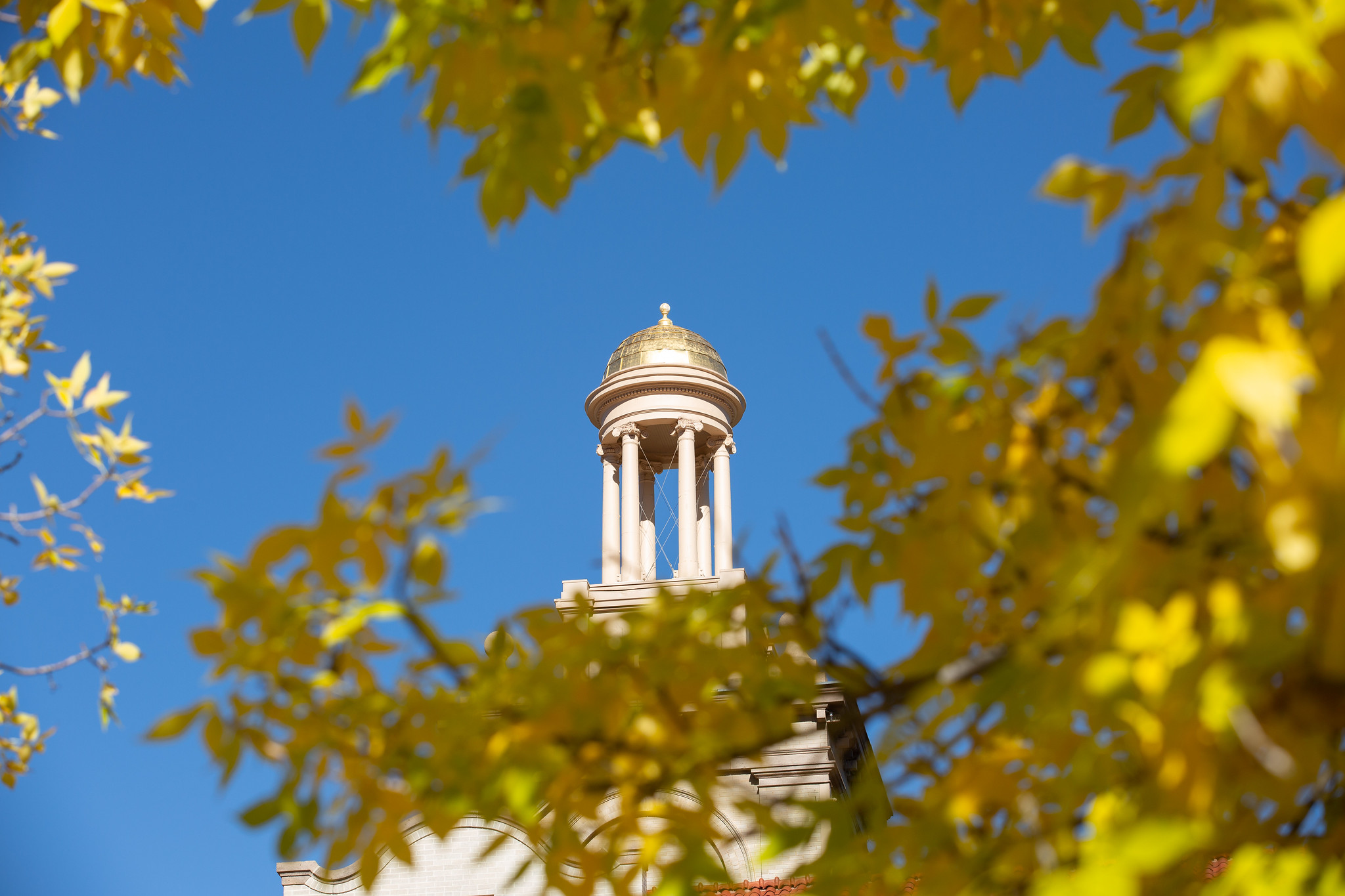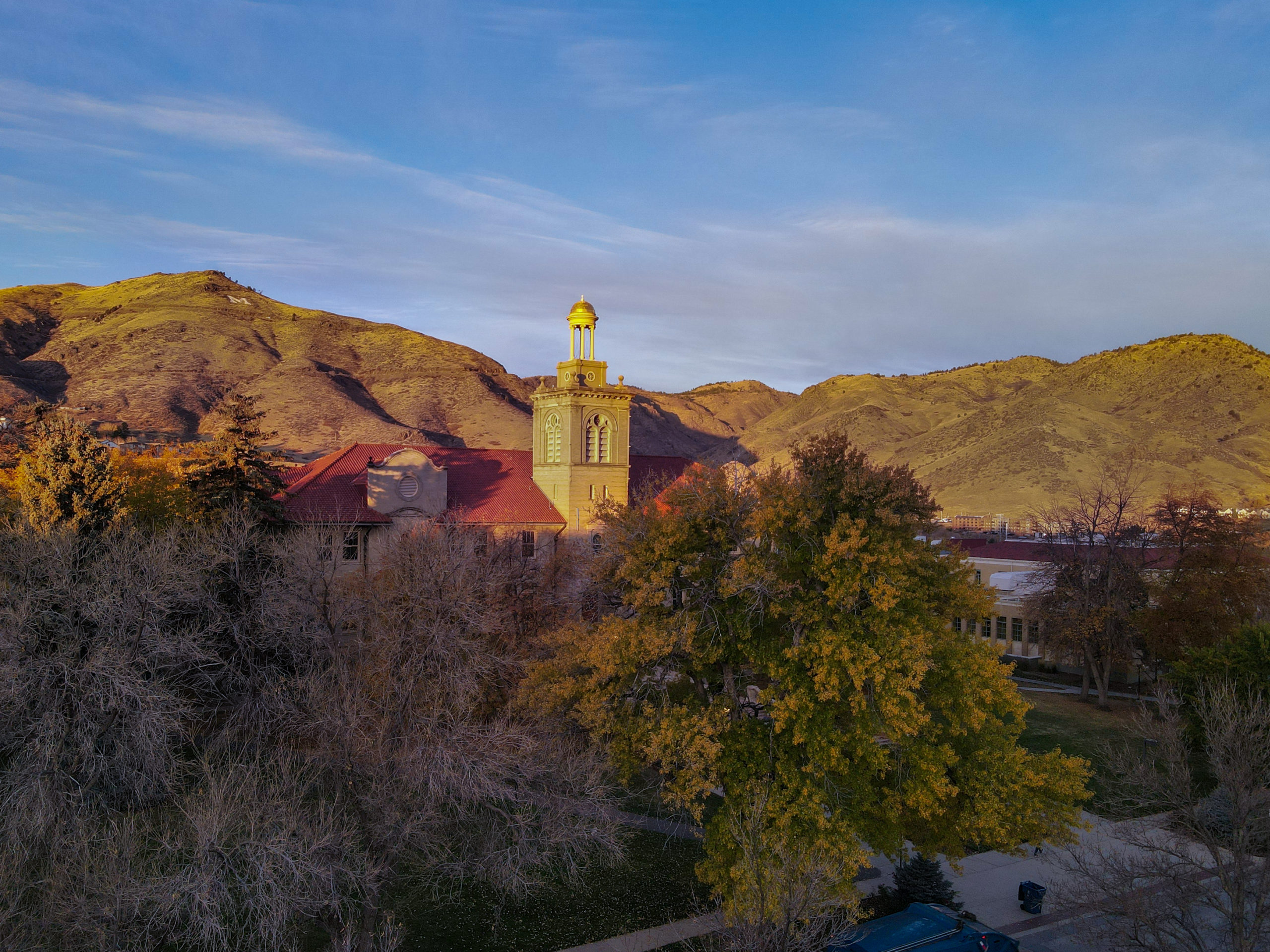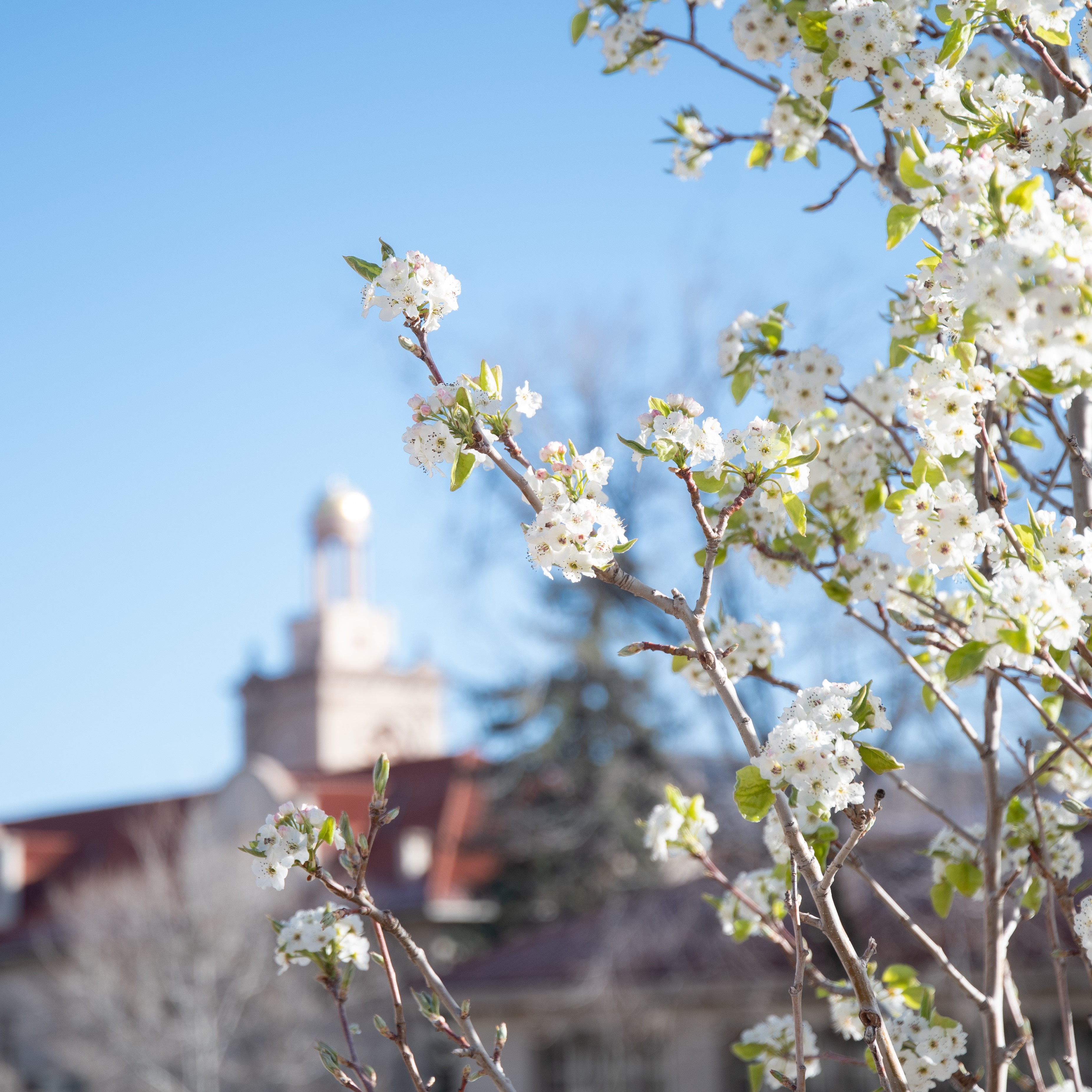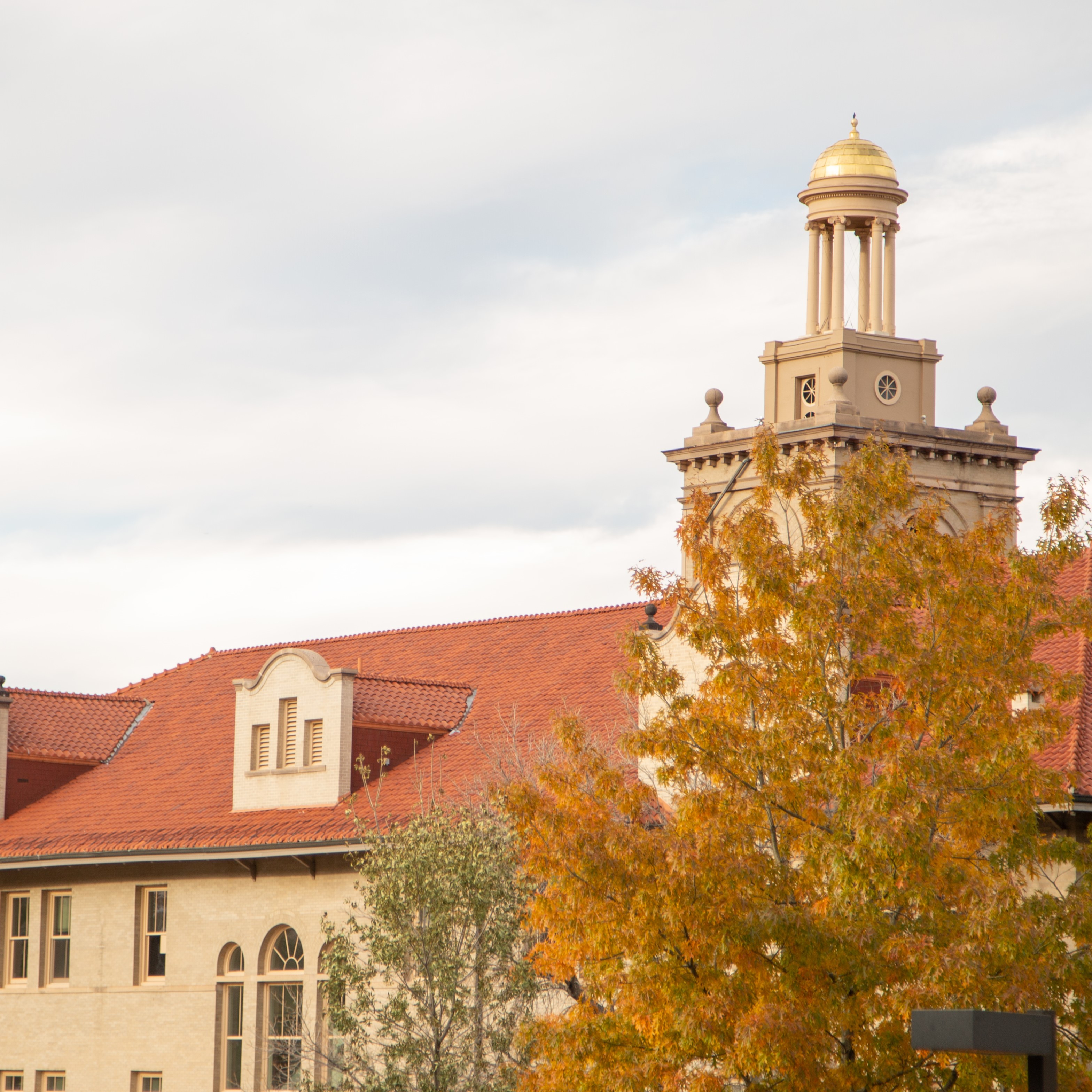The Office of Undergraduate Research & UHS Presents
The 2025 Spring Undergraduate Research Symposium
April 16-17, 2025
Spring 2025 Symposium Recap
Congratulations to the 2025 Spring Undergraduate Research Symposium oral and poster winners!
Oral Presentation Winners:
#1 | John Braford, Junior, CBE | Mentor(s): Colin Wolden | Synthesis and Characterization of Nickel-Based Catalyst for Low Temperature Ammonia Decomposition
#2 | Zoë Brouillet, Senior, CEE | Mentor(s): Reza Hedayat | Strength and Durability Performance of Sintered Geopolymer Bricks Made of Mine Tailings
#3 Tie | Dishita Sharma, Senior, Computer Science | Mentor(s): Dorit Hammerling | Camera – Based Detection and Quantification of Operational Emissions on an Oil and Gas Compressor Station
#3 Tie | Lydia Tan, Sophomore, EE | Mentor(s): Atef Elsherbeni | Coaxial Cable Parameters Visualization, Parallel Plates Parameters Visualization, and Two Wire Parameters Visualization
Poster Presentation Winners:
#1 | Gautier Moreau, Junior, CBE | Mentor(s): Ram Prasad Sekar, Ramya Kumar | Investigation of Cationic Polymer Microarchitecture for Effective CRIPSR/Cas9 Ribonucleoprotein Delivery
#2 Tie | Cami Lyman, Sophomore, QBE| Mentor(s): Kevin Cash, Adrian Mendonsa| Small Changes, Big Impact: How Oxygen Nanoparticle Size Affects Response
#2 Tie | Jesica Schmidt, Senior, MME; Brooklyn Dash, Senior, MME | Mentor(s): Terry Lowe | Steel Wars: The Surface Strikes Back
#3 | Logan Baker, Senior, CEE | Mentor(s): Christopher Bellona, Adria Lau, Tzahi Cath | Membrane Filtration System Construction and Analysis for Pilot-Scale PFAS Treatment System Utilizing CCMF, SAFF, and HALT for DoD site
First Year Honorable Mention | Andrew Rupeka, First Year, QBE | Mentor(s): Nikki Farnsworth, Jubril Akolade | Targeted Nanocapsules for Preventing β-Cell Destruction in Type 1 Diabetes


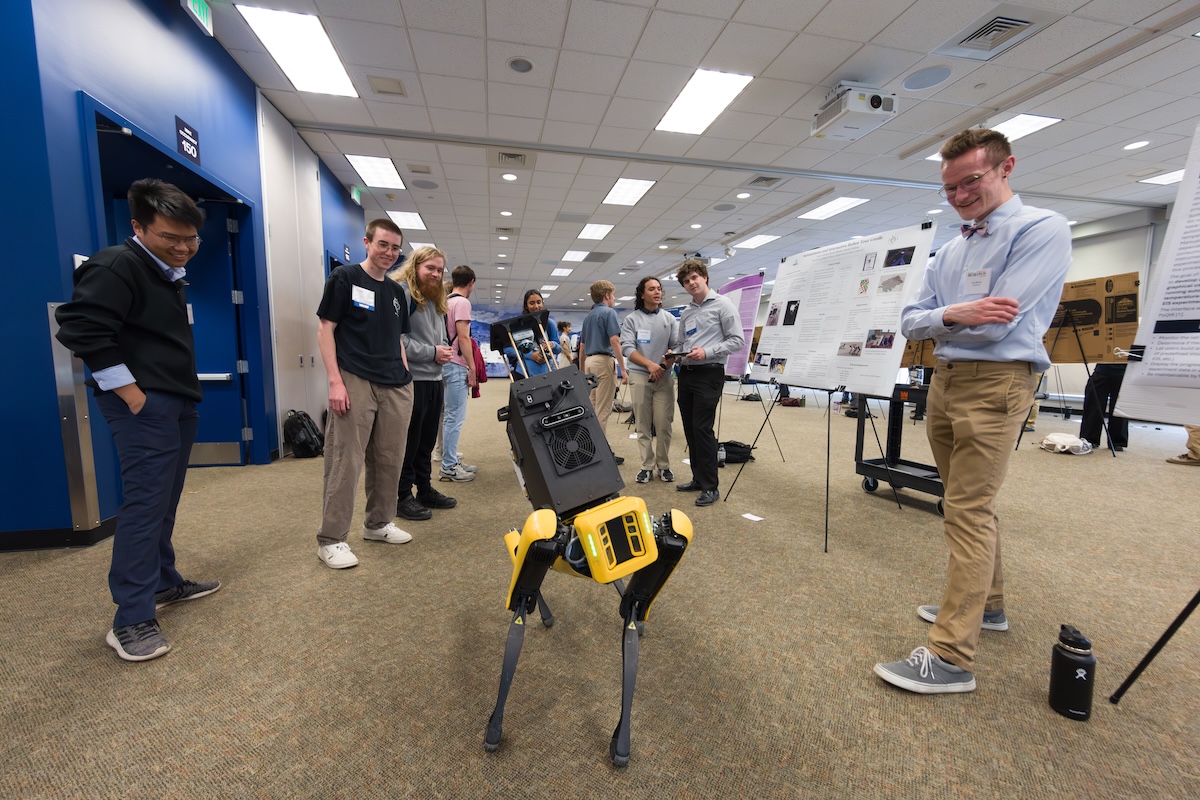
What do Undergraduate Researchers have to say About the Symposium?
“Having the chance to present at a symposium with my peers helped me become a better presenter, bolstered my relationship with my advisor, and gave me opportunities to communicate the value of my research to a large audience. I left the symposium a more confident and experienced researcher.”
“The Mines Undergraduate Research Symposium gave me the opportunity to practice my communication skills and learn how to talk about my research effectively to people from a wide variety of fields. In addition, I truly enjoyed seeing everyone else’s research projects and exploring how one issue can be tackled and studied through a variety of approaches. Being a part of the symposium was a really amazing experience, and I’m looking forward to the next one!”
“I really enjoyed participating in the Undergraduate Research Symposium. It allowed me to represent my research project in an inclusive and educative way. It gave me the opportunity to learn how to share my technical knowledge with others. It was interesting to learn about other people’s research project, network with them, and find parallels between our research. I would recommend presenting at Symposiums to any researcher who wants to share their passion with others and learn how to communicate technical research.”
2025 Presenter, Judge & Volunteer Registration Form
The registration form for Judging, Volunteering and Presenting will open soon.
2025 lunch Keynote Address RSVP
Nominate Your Mentor for the Undergraduate Research Mentor Award!
The award recognizes faculty, postdoc, and graduate student mentors who support undergraduate students in having enriching research experiences.
Spring 2025 Mentor Workshop RSVP
The mentoring workshop, “Intentionally Connecting Undergraduate Research & Careers: Infusing the NACE Competencies into Undergraduate Research Experiences,” will be hosted by Dr. Jeanne Mekolichick . It will take place Thursday, April 18th from 3-4:30pm in Student Center Ballrooms D&E.
Keynote Speaker: Dr. Jeanne Mekolichick
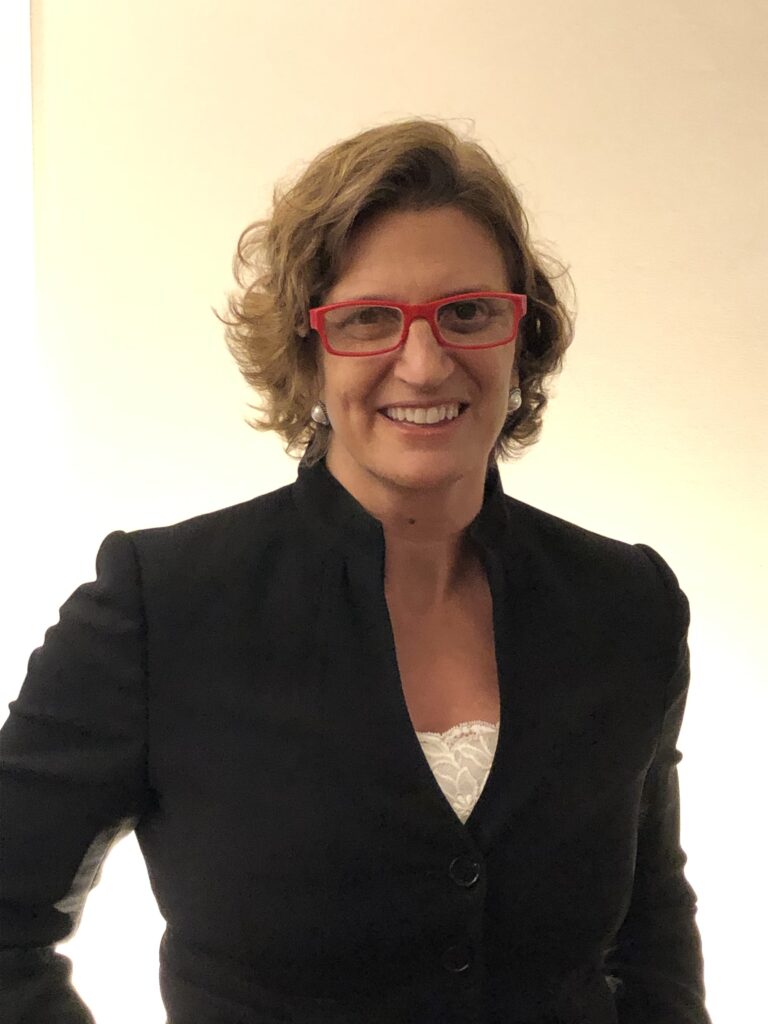 Join us for the lunch keynote address by Dr. Jeanne Mekolichick from 12pm-1pm in the Student Center Ballrooms D&E, on April 16th, 2025.
Join us for the lunch keynote address by Dr. Jeanne Mekolichick from 12pm-1pm in the Student Center Ballrooms D&E, on April 16th, 2025.
Realizing the Transformative Power of Undergraduate Research as Preparation for Academia and Industry
Undergraduate research (UR) has the power to impact the lives of students, faculty, and communities when programs are intentionally built in supportive environments. The Council on Undergraduate Research recently updated their Characteristics of Excellence in Undergraduate Research, summarizing best practices to support and sustain a vibrant UR ecosystem ensuring effective programs leading to impactful experiences for students. Using this best-practice approach, we will explore the transformative power of UR as a distinctive opportunity that adds value to the undergraduate experience for those who are continuing in the academy as well as those who are advancing directly into the world of work. This keynote will be of interest to faculty, administrators and students. Attendees will leave with a deeper understanding of best practices to support an effective UR environment, the benefits of UR experiences for various stakeholders, and how students, in particular, are positively impacted by their participation in UR experiences for their next steps in academia and industry.
Read Dr. Jeanne Mekolichick full bio here.
More about the Symposium
Timeline
Student Registration Deadline: Friday, March 28th, 2025
Final Registration Form for Judges & Volunteers: Rolling until filled
Posters Printed and Oral Presentation Slides Shared with Our Office:
- Posters: April 11th (April 14th is allowed, but may not be able to be fulfilled in time by the Mines Printing Center)
- Oral Presentation Slides: April 15th
Symposium: April 16th and 17th, 2025
Symposium Schedule OF EVENTS
Wednesday, April 16th
Poster Session #1: 9:30am-11am (Student Center Ballrooms A, B, C)
- Departments Presenting: Applied Math and Statistics, Arthur Lakes Library, Civil and Environmental Engineering, Economics and Business, Engineering, Design & Society, Geology and Geological Engineering, Geophysics, Humanities, Arts and Social Sciences, Mechanical Engineering, Mining Engineering, Petroleum Engineering, Physics
Keynote Lecture by Dr. Jeanne Mekolichick (Lunch Provided): 12-1pm (Student Center Ballrooms D & E) (RSVP here)
Poster Session #2: 2pm-3:30pm (Student Center Ballrooms A, B, C)
- Departments Presenting: Chemical and Biological Engineering, Chemistry, Computer Science, Electrical Engineering, Metallurgical and Materials Engineering
Thursday, April 17th
Oral Session: 11am-2pm (Student Center Ballrooms A, B, C)
Mentor Workshop hosted by Dr. Jeanne Mekolichick: 3pm-4:30pm (Student Center Ballrooms D & E) (RSVP Here)
about the symposium
The 2025 Spring Undergraduate Research Symposium will be held in person on Wednesday, April 16th and Thursday, April 17th in the Student Center Ballrooms. Judging will take place during the scheduled Oral and Poster presentations. Refreshments will be provided. All faculty, staff, and students are encouraged to join us in celebrating our hardworking undergraduate researchers and their dedicated mentors!
For further information, please contact the office of Undergraduate Research Scholars at ugresearch@mines.edu
Prepare to Present
Undergraduate Research Scholars has organized several workshops to help you participate in the symposium with as much confidence as possible!
WRITING SCIENTIFIC ABSTRACTS
Location: Zoom
Date & Time: March 5th, 2-2:50pm
Presenter: Dr. Lakshmi Krishna, Ashley Weibel
Register Here for the event!
With registration for the Mines Undergraduate Research Symposium underway, students are gearing up to craft an abstract describing their research. Despite the concise nature of the abstract, the challenge lies in distilling the essence of complex research into a succinct paragraph. This workshop is tailored to provide participants with a hands-on experience in refining their abstract-writing skills. Through critical examination of sample abstracts, attendees can fine-tune their abilities in crafting accessible and effective abstracts. The session will offer clarity on what elements to include and what to omit, empowering participants to create compelling abstracts that precisely convey the essence of their research.
DESIGNING SCIENTIFIC POSTERS
Location: Zoom
Date & Time: March 25th, 9-9:50am
Presenter: Dr. Lakshmi Krishna, Ashley Weibel
Registere here for the event!
With your registration for the Mines Undergraduate Research Symposium confirmed, it’s time to enhance your skills in designing and presenting impactful scientific posters. This workshop aims to equip participants with strategies to prepare and showcase their research effectively. The session will delve into the advantages of employing a backward design strategy for poster creation and exploring poster layout principles that enhance readability and engagement with the audience. An interactive component will challenge participants to put their skills to the test by critiquing existing posters.
DELIVERING IMPACTFUL ORAL RESEARCH TALK
Date & Time: March 27th, 4-4:50pm
Presenter: Dr. Lakshmi Krishna, Ashley Weibel
Register Here for the event!
Ever sat through a research talk that left you captivated, feeling like you were part of a compelling story? A well-delivered research talk shares a striking resemblance to storytelling. In this presentation, we will discuss tips to craft and deliver a research talk that not only conveys information but also engages and resonates with your audience. The talk will explore key aspects, including the art of structuring content, honing presentation skills, and infusing passion into your delivery.
Day-before symposium prep session
Date & Time: April 15th, 4-6pm
Presenter: Dr. Lakshmi Krishna, Ashley Weibel
Want to practice your poster pitch or oral presentation last-minute before the symposium? Office of Undergraduate’s Undergraduate Research Ambassadors (URAs) will be leading a Poster and Oral Practice. Poster presenters can swing by for a few minutes or for an hour, hang up your poster (if you are presenting in the morning session), and practice your poster pitch with a URA before the next day symposium. Oral presenters are also welcome to practice their oral presentation in front of a URA in the Ballrooms. We hope to see you there!
information for Judges and volunteers
Who’s eligible to be a judge or volunteer?
We encourage judges and volunteers from all departments to partake in this event. All interested faculty, staff, and graduate students are encouraged to judge and/or volunteer. Undergraduate student presenters are encouraged to present their research in a way that communicates their project effectively regardless of their audience’s background.
What is the time commitment of a judge or volunteer?
It depends. Generally, judging will take an hour to an hour and a half total (or about 15-20 minutes per project). Student presentations are fairly short, but judges may have additional questions before ranking the poster or oral talk. As for volunteers, the time commitment depends on how much time you are able to spare. Our office will need the most help during set-up and clean-up Wednesday and Thursday, times TBA.
How will student projects be evaluated?
Student projects will be evaluated differently depending on the format with which they chose to visually represent their work. Rubrics might ask judges to evaluate qualities such as visual organization, delivery, introduction, methods, conclusions, discussion, and interaction.
For further information, please contact the office of Undergraduate Research Scholars at ugresearch@mines.edu
Apply here to be a judge or volunteer!
guidelines, tips, & event resources
Tips when writing a scientific abstract
To register to participate in the Spring 2025 Undergraduate Research Symposium, you will need to w
- Here you can find the presentation slides for the below seminar on Writing Scientific Abstracts.
- Here you can find a recording of the Writing Scientific Abstracts seminar.
Event Resources
WRITING SCIENTIFIC ABSTRACTS
Location: Zoom
Date & Time: March 5th, 2-2:50pm
Presenter: Dr. Lakshmi Krishna, Ashley Weibel
Register Here for the event!
With registration for the Mines Undergraduate Research Symposium underway, students are gearing up to craft an abstract describing their research. Despite the concise nature of the abstract, the challenge lies in distilling the essence of complex research into a succinct paragraph. This workshop is tailored to provide participants with a hands-on experience in refining their abstract-writing skills. Through critical examination of sample abstracts, attendees can fine-tune their abilities in crafting accessible and effective abstracts. The session will offer clarity on what elements to include and what to omit, empowering participants to create compelling abstracts that precisely convey the essence of their research.
How to print a poster at Mines
The Office of Undergraduate Research Scholars will cover the cost of the first poster printed by student researchers presenting at the Undergraduate Research Symposium. Though you can order your poster at any time via the HelpDesk ticket system, the deadline to print posters for the spring symposium is 3 to 4 business days before the Symposium (4/11/25). Please follow the instructions below carefully:
- After you are finished making your poster, save it with a PDF file extension formatted for printing. Poster files should not be larger than 20mb. Prior to submitting a HelpDesk ticket, make sure your poster looks good. We recommend doing a scaled down test print on an 8.5″x11″ sheet of paper to make sure your poster looks presentable, legible, and the color is accurate.
- Once you have completed the final registration form, submit your poster for printing to ITS using the following instructions:
- Follow the link to the HelpDesk ticket for poster printing: ITS Poster Printing Ticket
- Click the orange button, “Request Poster Print”. Fill out, “Name of Project/Poster” with your poster title, “Requestor” with your name, and “Acct/Dept” with “Student”.
- Under “Select Payment Option”, select “Sponsored Group”. Under “Specify the group paying for the poster”, select “Undergraduate Research Symposium”. If you follow these steps, there is no cost to print your first poster. If your poster needs to be reprinted because of a formatting error, you will be responsible to cover the charges for printing it the second time.
- Lastly, under “Date and Time to Pick Up Requested Poster”, please give yourself enough time before the Symposium to pick it up and review it. Under “Poster Paper Widths Available” select the size of your PDF document. Posters should be 48 inches in width (left to right) and 36 inches in height (top to bottom).
- Once you have printed your poster, we encourage you to drop it off at our office (1704 Illinois St. Rm 105) for safe keeping until the Symposium.
Tips when creating a poster presentation
Save your poster with a .pdf file extension. When you create your poster, also consider how you might verbally present your research. How you talk about your research to passersby should complement your poster. Please view both the “Creating your Poster” and the “Talking About your Research” section of this toggle for general guidance. If you would like to view examples of posters, we encourage you visit our 2024 SURF Cohort page for additional examples online.
- Here you can find the presentation slides for the below seminar on Designing Scientific Posters.
- Here you can find a recording of the Designing Scientific Posters seminar.
Creating your Poster
- Creating Your Content: When you distill your research into a poster ready format, first and foremost, please speak to your mentor. For additional help, you should consider scheduling an appointment at the Writing Center through their online scheduler. Generally, effective posters include:
- Title that effectively communicates subject matter
- Purpose/objectives clearly stated
- Applicability or relevance of work identified
- Concise explanation of methods/analysis used
- Methods used clearly conveyed
- Conclusions supported by data
- Funding sources acknowledged
- Choosing a Program (to Create Your Poster): There are many programs you can use to create a poster ranging in costs and discoverability. Regardless, make sure the program you’re using allows you to create a custom document size (not to exceed 48 inches wide by 36 inches tall). Many researchers use Microsoft PowerPoint or Publisher because these are inexpensive and easy to use. You can also use more advance programs like Adobe Illustrator or InDesign; but, these can have a steep learning curve and tend to be very expensive. Some free, open source options include LibreOffice, Gimp, or Inkscape.
- Height & Width: Posters printed at Mines should not exceed 48 inches in width (left to right) and 36 inches in height (top to bottom) at 72 – 300 DPI. Posters should be legible form a few feet away.
- Color: It is recommended you choose a lighter color for the poster background, preferably white. There are no other color restrictions for the text and images.
- Font: Make sure the poster title and the author names are clearly identified. Choose a font size such that text on your poster is legible when looked at from a distance. Here is a recommendation for font sizes:
- 85 pt for the title
- 56 pt for the authors
- 36 pt for the subtitles
- 24 pt for the main text
- 18 pt for image captions
- General Principles of Design: Avoid using excessive text as it makes it difficult to follow the poster. Use appropriate graphics wherever possible as they can convey information effectively and make the poster look appealing.
Talking About Your Research
- Length: The length of time you spend talking about your research will vary, but it’s advisable to prepare an elevator pitch to briefly summarize your research. Generally, this is a 1-2 minute summary discussing the most important and interesting parts of your project in a way that anyone can understand.
- Content: How you talk about your research should be planned and practiced. Keep it concise and make sure to touch on the tacit points of your research. Be mindful of your audience and pacing. The best poster presentations invite questions while still breaking down your research for an audience that might know very little about your project. Try answering the question, “What is your research about?” and “Why is it interesting?” in a way that makes sense to researchers and non-researchers alike.
Event Resources
DESIGNING SCIENTIFIC POSTERS
Location: Zoom
Date & Time: March 25th, 9-9:50am
Presenter: Dr. Lakshmi Krishna, Ashley Weibel
Registere here for the event!
With your registration for the Mines Undergraduate Research Symposium confirmed, it’s time to enhance your skills in designing and presenting impactful scientific posters. This workshop aims to equip participants with strategies to prepare and showcase their research effectively. The session will delve into the advantages of employing a backward design strategy for poster creation and exploring poster layout principles that enhance readability and engagement with the audience. An interactive component will challenge participants to put their skills to the test by critiquing existing posters.
DAY-BEFORE SYMPOSIUM PREP SESSION
Date & Time: April 15th, 4-6pm
Presenter: Dr. Lakshmi Krishna, Ashley Weibel
Want to practice your poster pitch or oral presentation last-minute before the symposium? Office of Undergraduate’s Undergraduate Research Ambassadors (URAs) will be leading a Poster and Oral Practice. Poster presenters can swing by for a few minutes or for an hour, hang up your poster (if you are presenting in the morning session), and practice your poster pitch with a URA before the next day symposium. Oral presenters are also welcome to practice their oral presentation in front of a URA in the Ballrooms. We hope to see you there!
Tips when creating an oral presentation
Oral presentations tend to be a more in depth talks about an individual’s research. All oral presentations in the 2025 Undergraduate Research Symposium require a 10-12 minute live slide presentation. If you would like to view virtual oral presentations, we encourage you watch the video recording of Stephanie Morrall’s winning presentation from Spring 2024 under the section “Spring 2024 Symposium Recap.”
- Here you can find the slides for the presentation below on Delivering Impactful Oral Research Talks.
Creating your Slides
Overall, presentation slides can contain the same (or similar) information as a poster:
- Creating Your Content: First and foremost, please speak to your mentor regarding content. For additional help, you should consider scheduling an appointment at the Writing Center through their online scheduler.You can also view some tips provided by the University of Pittsburgh here, or some tips from the CLIMB Program, here. Some general guidelines when preparing your presentation is to make sure:
- The title effectively communicates subject matter.
- Purpose/objectives are clearly stated.
- Applicability or relevance of work is identified.
- Concise explanation of methods/analysis are used.
- Methods used are clearly conveyed.
- Conclusions are supported by data.
- Funding sources are acknowledged.
- Choosing a Program (to Create Your Presentation): Some common programs include Google Slides or PowerPoint. It doesn’t matter what you choose. PowerPoint tends to be a little more versatile in options. For an introduction to Google Slides, please follow this link. For more information about Microsoft PowerPoint, please follow this link.
- Length of Presentation: Rather than giving a limit on file size or slide number, we recommend that presentation be about 10-12 minutes when you go through the slides aloud. Try not to overwhelm the audience with too many slides; but, make sure you’re engaging them with visual aids.
- General Principles of Design: Similar to creating a poster, be mindful that an audience may lose interest in long presentations that are text heavy. Use appropriate graphics wherever possible as they can convey information effectively and make the presentation look appealing. Be mindful of color, font size, and image resolution. Sometimes, it can be helpful to find a presentation you like and try to emulate that style.
Event Resources
DELIVERING IMPACTFUL ORAL RESEARCH TALK
Date & Time: April 2nd, 4-4:50pm
Presenter: Dr. Lakshmi Krishna, Ashley Weibel
Register Here for the event!
Ever sat through a research talk that left you captivated, feeling like you were part of a compelling story? A well-delivered research talk shares a striking resemblance to storytelling. In this presentation, we will discuss tips to craft and deliver a research talk that not only conveys information but also engages and resonates with your audience. The talk will explore key aspects, including the art of structuring content, honing presentation skills, and infusing passion into your delivery.
DAY-BEFORE SYMPOSIUM PREP SESSION
Date & Time: April 15th, 4-6pm
Presenter: Dr. Lakshmi Krishna, Ashley Weibel
Want to practice your poster pitch or oral presentation last-minute before the symposium? Office of Undergraduate’s Undergraduate Research Ambassadors (URAs) will be leading a Poster and Oral Practice. Poster presenters can swing by for a few minutes or for an hour, hang up your poster (if you are presenting in the morning session), and practice your poster pitch with a URA before the next day symposium. Oral presenters are also welcome to practice their oral presentation in front of a URA in the Ballrooms. We hope to see you there!
Myth Busters!
I have to have completed my research and collected all my data before presenting in the Undergraduate Research Symposium
False! You can participate in the Undergraduate Research Symposium even if your research is still in progress. When discussing the results of your research, share whatever data you do have, and consider discussing expected results.
The Undergraduate Research Symposium is only for very accomplished, upper-classmen undergraduate researchers
False! Any undergraduate student who has conducted research is more than welcome to present during the Undergraduate Research Symposium. It’s never too early to have this valuable experience.
Presenting at the Undergraduate Research Symposium will not benefit me
False! Presenting at the symposium is a valuable opportunity to develop your professional communication skills and can be discussed to your advantage on your resume or in a job interview!








